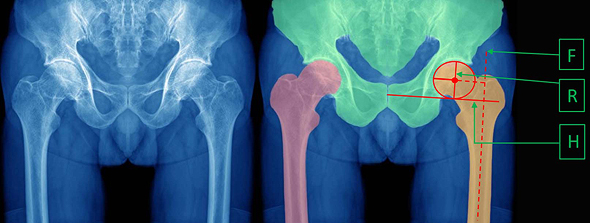This Startup Uses AI to Revolutionize a Surgery That Has Been Around for Decades
Jerusalem-based RSIP Vision develops computer vision technology to better visualize bones ahead of hip and knee replacement procedures to minimize human error
16:3809.02.20
A millimeter may be an extremely small unit of length, but when it comes to orthopedic surgeries—and hip and knee replacements in particular—a millimeter could make all the difference in the world. When creating and placing a prosthetic joint, a deviation of even a single millimeter could lead to lots of pain, and potentially even the need for additional corrective surgeries. Jerusalem-based startup RSIP Vision Ltd. develops computer vision technology to better visualize bones and joints ahead of such procedures, to minimize human error and maximize success.
Hip replacement, or hip arthroplasty, involves the removal and replacement of a damaged hip joint with an artificial joint typically made from metal or plastic. More than 300,000 total hip replacements are performed each year in the U.S. alone, according to the American Academy of Orthopaedic Surgeons.

RSIP Vision's technology. Photo: RSIP Vision
Traditionally, a medical professional would try to manually measure the cartilage using visualization technologies such as vertical gauges and rulers and analyzing X-rays, in a process that has seen its share of minor errors, Ron Soferman, RSIP Vision’s founder and CEO, said in a recent interview with Calcalist.
RSIP Vision helps automate the measurement of bones and cartilage using computer vision and deep learning technology. The company’s technology provides an automated, precise 3D visualization of the patients' hip to assist physicians in better planning the surgery, Soferman said. The company’s artificial intelligence modules automate the segmentation and landmark detection of the patient's body structure, making surgery preparation easier and more accurate, Soferman said.
RSIP Vision is bootstrapped. The company employs a team of 50 employees in Jerusalem, San Francisco, and Boston, Soferman said.



